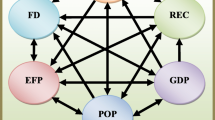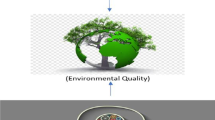Abstract
As a contribution to the technological innovation-natural resource rent-environment literature, this study examines the technological innovation and natural resource rent in an environmental Kuznets curve (EKC) multivariate framework. We employed reliable, robust, and efficient novel panel estimations methods on a sample of 10 newly industrialized countries (NICs) over the periods 1990 and 2018. To achieve our study objective, we employ the method of moments quantile regression (MMQR) approach to analyze the effects of the exogenous variables over the range of diverse quantiles of carbon emissions. Results generated from the MMQR mimic that of the three heterogeneous linear panel estimations (fully modified ordinary least square, the dynamic ordinary least square, and the fixed effects ordinary least square) in terms of the sign and magnitude. The result affirms the existence of the environmental Kuznets curve (EKC) hypothesis in NICs across all quantiles (0.1–0.95). In addition, technological innovation and renewable energy consumption improve environmental quality in NICs across quantiles (0.1–0.95), while the joint impact of technological and natural resource rent mitigates environmental degradation from lower to higher quantiles (0.1–0.90). Moreover, technological innovation is found to exert an indirect favorable impact on the environment through the pathway of natural resources. Thus, technological innovation can be anticipated to enhance sustainable natural resources exploration in the NICs. In line with these crucial outcomes, this research proposes that the NICs should promote technological innovation, promote sustainable natural resource exploitation, and expedite economic expansion rates via the sustainable transformation of their production and consumption processes.


Similar content being viewed by others
Availability of data and material
Corresponding authors can provide data used in the study on appropriate request.
References
Adebayo TS, Acheampong AO (2021) Modelling the globalization-CO2 emission nexus in Australia: evidence from quantile-on-quantile approach. Environ Sci Pollut Res:1–16. https://doi.org/10.1007/s11356-021-16368-y
Adebayo TS, Kirikkaleli D (2021) Impact of renewable energy consumption, globalization, and technological innovation on environmental degradation in Japan: application of wavelet tools. Environ Dev Sustain:1–26
Akadiri SS, Akadiri AC (2020) Interaction between CO2 emissions, energy consumption and economic growth in the Middle East: panel causality evidence. Int J Energy Technol Policy 16(2):105–118
Alola AA, Adebayo TS, Onifade ST (2021) Examining the dynamics of ecological footprint in China with spectral Granger causality and quantile-on-quantile approaches. International Journal of Sustainable Development & World Ecology:1–14
An H, Razzaq A, Haseeb M, Mihardjo LW (2021) The role of technology innovation and people’s connectivity in testing environmental Kuznets curve and pollution heaven hypotheses across the Belt and Road host countries: new evidence from Method of Moments Quantile Regression. Environ Sci Pollut Res 28(5):5254–5270
Anwar A, Siddique M, Dogan E, Sharif A (2021) The moderating role of renewable and non-renewable energy in environment-income nexus for ASEAN countries: evidence from Method of Moments Quantile Regression. Renew Energy 164:956–967
Awosusi AA, Kirikkaleli D, Adebayo TS, Akinsola GD, Mwamba MN (2021) Can CO 2 emissions and energy consumption determine the economic performance of South Korea? A time series analysis. Environ Sci Pollut Res:1–16
Aziz N, Mihardjo LW, Sharif A, Jermsittiparsert K (2020) The role of tourism and renewable energy in testing the environmental Kuznets curve in the BRICS countries: fresh evidence from methods of moment quantile regression. Environ Sci Pollut Res 27(31):39427–39441
Aziz N, Sharif A, Raza A, Jermsittiparsert K (2021) The role of natural resources, globalization, and renewable energy in testing the EKC hypothesis in MINT countries: new evidence from Method of Moments Quantile Regression approach. Environ Sci Pollut Res 28(11):13454–13468
Bekun FV, Gyamfi BA, Onifade ST, Agboola MO (2021) Beyond the environmental Kuznets Curve in E7 economies: accounting for the combined impacts of institutional quality and renewables. J Clean Prod:127924
Driscoll JC, Kraay AC (1998) Consistent covariance matrix estimation with spatially dependent panel data. Rev Econ Stat 80(4):549–560. https://doi.org/10.1162/00346539855782
Eluwole KK, Saint Akadiri S, Alola AA, Etokakpan MU (2020) Does the interaction between growth determinants a drive for global environmental sustainability? Evidence from world top 10 pollutant emissions countries. Sci Total Environ 705:135972
Gyamfi BA, Onifade ST, Nwani C, Bekun FV (2021) Accounting for the combined impacts of natural resources rent, income level, and energy consumption on environmental quality of G7 economies: a panel quantile regression approach. Environ Sci Pollut Res:1–13
He X, Adebayo TS, Kirikkaleli D, Umar M (2021) Consumption-based carbon emissions in Mexico: an analysis using the dual adjustment approach. Sustain Prod Consump 27:947–957
Huaman RNE, Jun TX (2014) Energy related CO2 emissions and the progress on CCS projects: a review. Renew Sust Energ Rev 31:368–385
Kao C, Chiang M-H, Chen B (1999) International R&D spillovers: an application of estimation and inference in panel cointegration. Oxf Bull Econ Stat 61(S1):691–709. https://doi.org/10.1111/1468-0084.0610s1691
Karaduman C (2021) The effects of economic globalization and productivity on environmental quality: evidence from newly industrialized countries. Environ Sci Pollut Res:1–14
Kaufmann RK, Davidsdottir B, Garnham S, Pauly P (1998) The determinants of atmospheric SO2 concentrations: reconsidering the environmental Kuznets curve. Ecol Econ 25(2):209–220
Kihombo S, Ahmed Z, Chen S, Adebayo TS, Kirikkaleli D (2021) Linking financial development, economic growth, and ecological footprint: what is the role of technological innovation? Environ Sci Pollut Res:1–11
Kirikkaleli D, Adebayo TS (2021) Do public-private partnerships in energy and renewable energy consumption matter for consumption-based carbon dioxide emissions in India? Environ Sci Pollut Res:1–14
Machado JAF, Santos Silva JMC (2019) Quantiles via moments. J Econ 213(1):145–173. https://doi.org/10.1016/j.jeconom.2019.04.009
Onifade ST, Alola AA, Erdoğan S, Acet H (2021a) Environmental aspect of energy transition and urbanization in the OPEC member states. Environ Sci Pollut Res 28(14):17158–17169
Onifade ST, Erdoğan S, Alagöz M, Bekun FV (2021b) Renewables as a pathway to environmental sustainability targets in the era of trade liberalization: empirical evidence from Turkey and the Caspian countries. Environ Sci Pollut Res:1–12
Onifade ST, Gyamfi BA, Haouas I, Bekun FV (2021c) Re-examining the roles of economic globalization and natural resources consequences on environmental degradation in E7 economies: are human capital and urbanization essential components? Res Policy 74:102435
Pedroni P (2004) Panel cointegration: asymptotic and finite sample properties of pooled time series tests with an application to the PPP hypothesis. Econometric Theory 20(3):597–625. https://doi.org/10.1017/S0266466604203073
Rahman MM, Nepal R, Alam K (2021) Impacts of human capital, exports, economic growth and energy consumption on CO2 emissions of a cross-sectionally dependent panel: evidence from the newly industrialized countries (NICs). Environ Sci Pol 121:24–36
Ramzan M, He K, Awosusi AA, Ahmed Z, Ahmad M and Altuntaş M (2021) Does Globalization Moderate the Effect of Economic Complexity on CO2 Emissions? Evidence From the Top 10 Energy Transition Economies. Front Environ Sci 3(9):23–35. https://doi.org/10.3389/fenvs.2021.778088
Rjoub H, Akinsola GD, Oladipupo SD, Adebayo TS (2021) The asymmetric effects of renewable energy consumption and trade openness on carbon emissions in Sweden: new evidence from quantile-on-quantile regression approach. Environ Sci Pollut Res:1–12. https://doi.org/10.1007/s11356-021-15706-4
Saint Akadiri S, Alola AA, Olasehinde-Williams G, Etokakpan MU (2020) The role of electricity consumption, globalization and economic growth in carbon dioxide emissions and its implications for environmental sustainability targets. Sci Total Environ 708:134653
Shan S, Ahmad M, Tan Z, Adebayo TS, Li RYM, Kirikkaleli D (2021) The role of energy prices and non-linear fiscal decentralization in limiting carbon emissions: tracking environmental sustainability. Energy 234:121243
Sharif A, Bhattacharya M, Afshan S, Shahbaz M (2021) Disaggregated renewable energy sources in mitigating CO2 emissions: new evidence from the USA using quantile regressions. Environ Sci Pollut Res. https://doi.org/10.1007/s11356-021-13829-2
Stern DI, Kander A (2012) The role of energy in the industrial revolution and modern economic growth. Energy J 33(3)
Su ZW, Umar M, Kirikkaleli D, Adebayo TS (2021) Role of political risk to achieve carbon neutrality: evidence from Brazil. J Environ Manag 298:113463
Vaseer, A. I., Ahmed, Z., Kihombo, S., Chen, S., Kirikkaleli, D., & Adebayo, T. S. (2021). Is there a tradeoff between financial globalization, economic growth, and environmental sustainability? An advanced panel analysis. Environ Sci Pollut Res, 1-11.
Wencui D, Ke F (2013) Does urbanization cause air pollution? Empirical evidence from emerging economies. Comp Econ Soc Syst 05
Zhang B, Wang B, Wang Z (2017) Role of renewable energy and non-renewable energy consumption on EKC: evidence from Pakistan. J Clean Prod 156:855–864
Zhang L, Li Z, Kirikkaleli D, Adebayo TS, Adeshola I, Akinsola GD (2021) Modeling CO2 emissions in Malaysia: an application of Maki cointegration and wavelet coherence tests. Environ Sci Pollut Res 28(20):26030–26044
Author information
Authors and Affiliations
Contributions
TSA collected data and analyzed the data. NU wrote the introduction and literature review. SSA wrote the result, conclusion, and policy suggestion. ATA worked on study development and proofreading.
Corresponding author
Ethics declarations
Ethics approval and consent to participate
NA
Consent for publication
NA
Competing interests
The authors declare no competing interests.
Additional information
Responsible Editor: Nicholas Apergis
Publisher’s note
Springer Nature remains neutral with regard to jurisdictional claims in published maps and institutional affiliations.
The contents of this paper are the authors’ sole responsibility. They do not represent the views of any of the institutions.
Rights and permissions
About this article
Cite this article
Adebayo, T.S., Akadiri, S.S., Adedapo, A.T. et al. Does interaction between technological innovation and natural resource rent impact environmental degradation in newly industrialized countries? New evidence from method of moments quantile regression. Environ Sci Pollut Res 29, 3162–3169 (2022). https://doi.org/10.1007/s11356-021-17631-y
Received:
Accepted:
Published:
Issue Date:
DOI: https://doi.org/10.1007/s11356-021-17631-y




